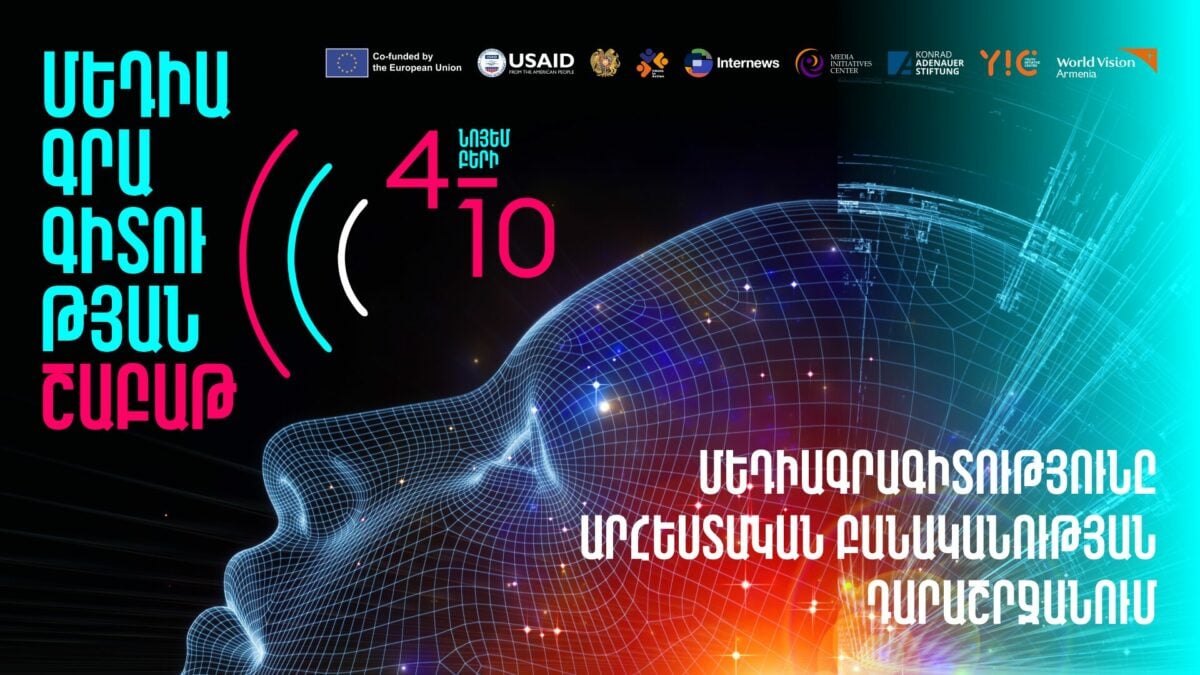The Media Initiatives Center, in collaboration with the RA Ministry of Education, Science, Culture, and Sports, has announced November 4-10, 2024, as Media Literacy Week in Armenia. All schools, kindergartens, universities, libraries, educational and cultural centers, and other interested institutions in Armenia are invited to participate in this event.
Media Literacy Week is an annual initiative that allows educational organizations and institutions to host events and classes utilizing the current educational materials. Participants can engage in both online and face-to-face meetings, as well as develop and implement educational projects that integrate media literacy into the curriculum in line with the new standards.
Media Literacy Week is an international movement led by UNESCO, held every fall, with the aim of drawing greater attention to the important issues of understanding, analyzing, and using media literately and effectively.
The Media Literacy Week is being held in Armenia for the seventh consecutive year under the theme “Media Literacy in the Age of Artificial Intelligence.”
Panel discussions, master classes, a large teaching forum, meetings and courses in libraries, universities, and schools, as well as regional meetings, presentations of new books and manuals, and discussions with industry experts and journalists. Events are diverse and designed to cater to everyone.
Artificial intelligence increasingly shapes today’s world, creating new opportunities and challenges. Media literacy helps us understand and work with these issues while avoiding new pitfalls.
Media literacy serves as a valuable guide for understanding how information flows, recognizing quality journalism, and monitoring our digital behavior and media habits. It helps both ourselves and others to make fact-based judgments, engage in open discussions about issues, and express our opinions respectfully without causing offense or spreading hate. Enhancing media literacy allows us to avoid traps and dangers, resisting propaganda and fallacies.
How to join Media Literacy Week:
- Follow the Facebook pages of ESCS and MIC,
- Enhance your media literacy skills by taking the Media E-Literacy online course and the new Understanding Media: Like a Hand’s Five Fingers course,
- Explore the Media E-Literacy teacher’s manual published by MIC, endorsed by ESCS, to conduct educational projects based on it,
- Refer to the manual “Understanding Media: Like a Hand’s Five Fingers” published by MIC, and conduct training sessions on the suggested topics using the included toolkit.
- Explore additional media literacy resources available on the Media.am website and utilize them for conducting classes, discussions, and events.
- Invite a dependable journalist to meet with students or arrange a visit to a media outlet,
- Listen to the Encyclomedia podcast series on media literacy,
- Play media literacy computer and board games,
- For teachers: participate in online and offline meetings, present articles on media and media literacy topics, and share experiences and implemented projects,
- Create and share educational materials and media literacy guidelines for social media using the hashtags #esmediaagratem and #mediaagreementweek2024.
If you have questions about Media Literacy Week, please contact Media Literacy Program Coordinator Ani Yeghiazaryan at [email protected] or call 095583616.
Find more on Media Literacy Week here:

Media Literacy Week is held in the framework of the “Youth in Action: Youth Empowerment and Leadership Development in Armenia” Project, a co-funded initiative by the European Union and the Konrad Adenauer Foundation (KAS) implemented together with the World Vision Armenia (WVA), Media Initiatives Center (MIC), and Gyumri “Youth Initiatives Centre” (YIC).
Media Literacy Week is made possible by the generous support of the American people through the United States Agency for International Development (USAID)․






